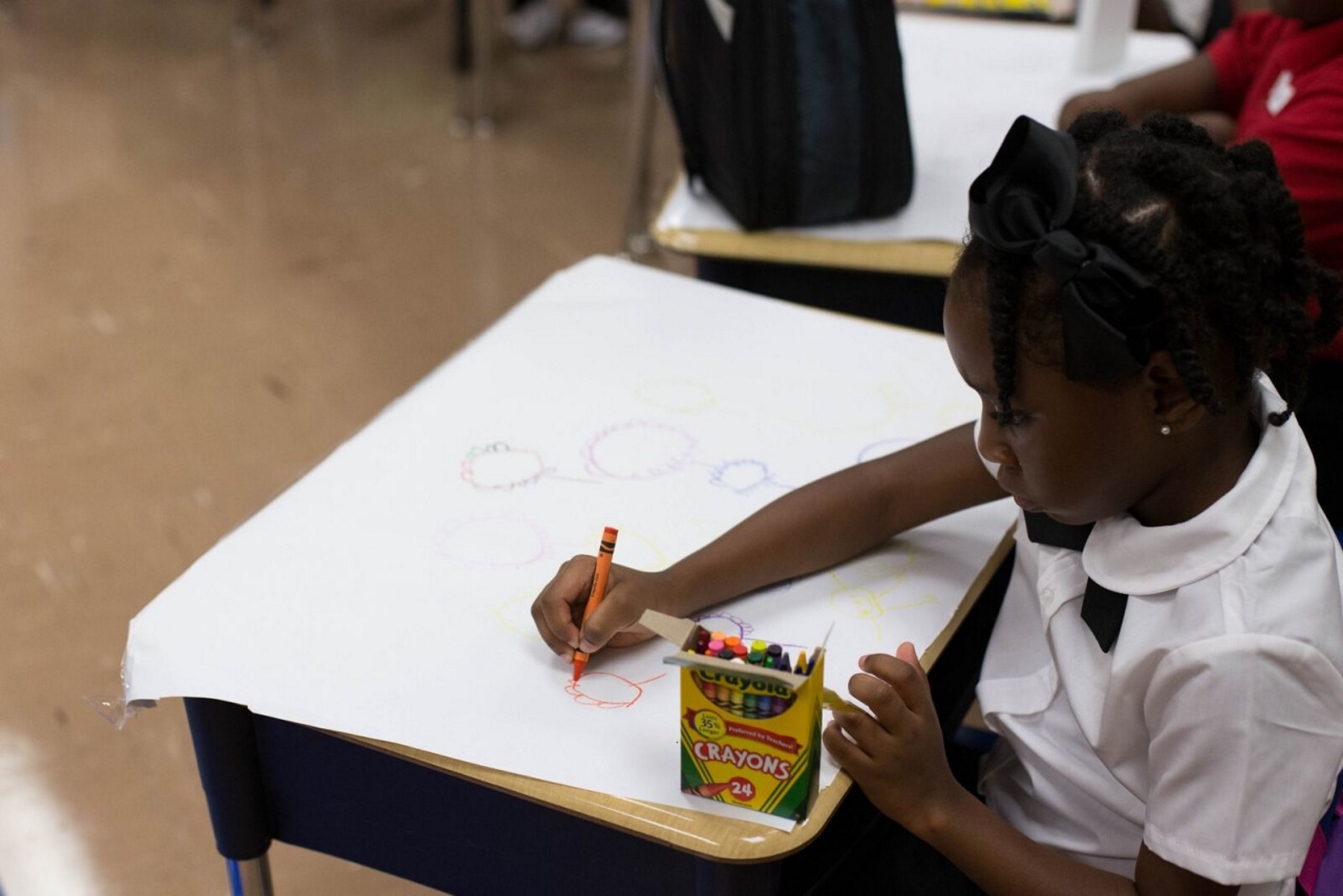Teachers Turn To Crowdfunding To Pay For Some Classroom Supplies

There seems to be a consensus among advocates that while the rescue package will help, the money won’t go far enough.
Ian Palmer / For WABE
As the new school year begins, teachers are likely to dip into their own bank accounts to pay for supplies for their students.
A 2018 survey from the National Center for Education Statistics (NCES) shows 94% of classroom teachers spend their own money on classroom materials. But more teachers are turning to crowdfunding websites, like Donors Choose and Adopt-A-Classroom, to help fund projects.
Donors Choose claims that more than 80% of schools across the country have at least one teacher who has used the site.
Typically, teachers post a description of a project or materials they want to be funded and the total cost. They may include a story or some background on themselves and their students. Donations are open to the public.
For Donors Choose, the money has to be raised within a certain amount of time. If it is, the supplies are purchased and sent to the teacher at her school. If not, donations from the teacher’s friends and family are rolled over to the teacher’s next project. Donors who aren’t friends or family can choose how to apply the amount they pledged to donate.
Picking Projects
Theresa Hines teaches science and gifted education at Peachcrest Elementary School in the DeKalb County School District. She’s been with DeKalb for 25 years.
For the past few years, she and some of her co-workers have used crowdfunding sites to pay for some class projects. Peachcrest is a Title I school, which means it’s entitled to receive some federal funds because it serves a low-income population. But Title I schools are usually required to spend the money a certain way.
Crowdfunding sites give teachers the autonomy to pick the projects they want.
Hines helped launch a robotics program at her school last year and plans to use Donors Choose to help raise money for new materials so the school can expand the program. This year, her students also got new supplies, thanks to crowdfunding.
“What I have is pencil pouches for the kids to use with crayons, colored pencils, pens and markers, erasers,” she said.
Actually, each of Hines’ students got two sets of supplies, so they can keep one at home.
“I’ve found over the years [that] a lot of kids don’t have any resources at home to do their homework that the teachers assign,” Hines said. “So, a lot of times when the homework is not completed, it’s not because the kids don’t want to, it’s because they don’t have supplies at home.”
Hines is a veteran educator, but new teachers, like Elizabeth Evans, have also found crowdfunding useful.
Evans is a second-year teacher who works in Forsyth County Schools. Her school’s Parent Teacher Association (PTA) gives teachers $50 a year to spend on their classrooms. She says that went quickly last year.
“About two or three weeks in, I started learning [about] some things that I didn’t have, but also wasn’t financially set to just go out and invest in everything I needed on my own,” Evans said.
So, she turned to a crowdfunding site, where she asked for folders, an easel and writing materials for her first-graders. Evans says some of her students’ parents donated, but so did total strangers. One person donated about $100 and left a message for Evans that read:
“Thanks for being a teacher, [I] hope this will help get everything you need.”
Potential Problems?
As crowdfunding has become more popular, some school districts have developed policies that govern how to use the sites.
The Metro Nashville Public Schools in Tennessee banned teachers from using crowdfunding sites last spring. The district said the ban could be temporary while officials develop crowdfunding policies. Some officials raised concerns about sites that direct money to individuals instead of sending the supplies to schools as well as a lack of oversight.
Metro Atlanta school districts haven’t banned crowdfunding altogether. But some, like the Cobb County School District, ban specific sites.
Cobb lets teachers use Donors Choose, where supplies are donated to schools. However, the district doesn’t let teachers use sites like Go Fund Me, which send money to fundraisers.
The DeKalb County School District has detailed guidelines on how educators should use crowdfunding sites.
The Fulton County School System allows teachers to use Donors Choose and has partnered with a platform called Purposity, which works with nonprofits and schools to identify areas of need.
Most districts, whether through a specific crowdfunding policy or a general fundraising statute, require teachers to seek their principals’ approval before making a funding request.








